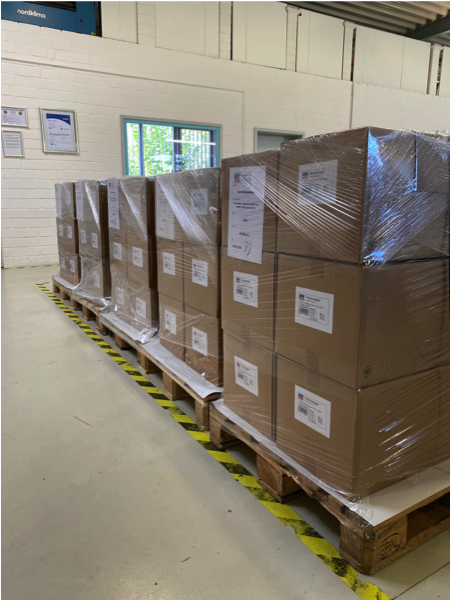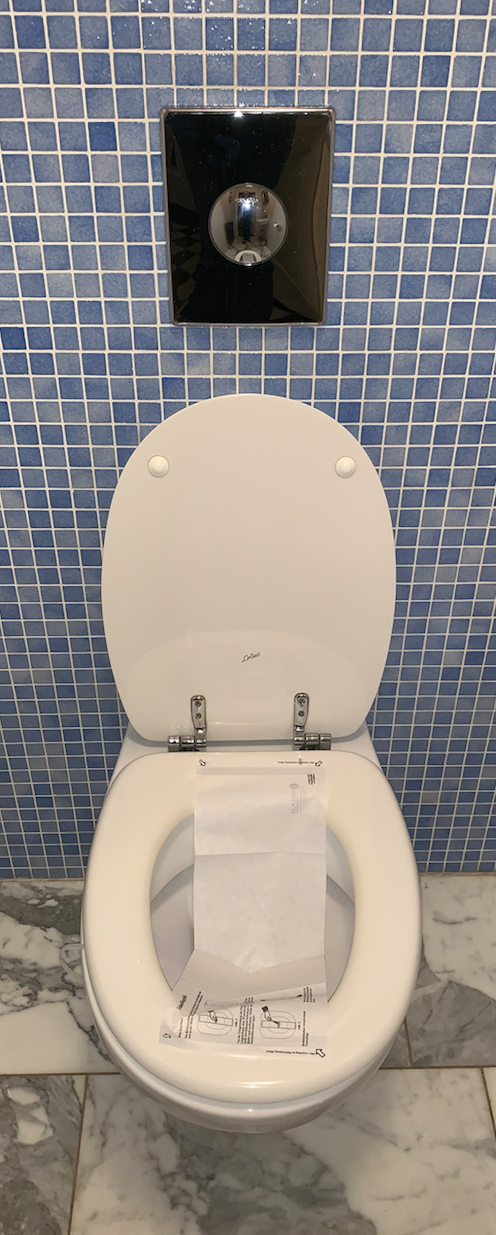Why Are More Younger People Getting Colon Cancer? The Theories on Inflammation & Gut Bacteria
(www.survivornet.com, 8-February 2020)
Colon cancer is on the rise among younger people, and no one knows exactly why.
It’s not simply that typical colon cancers are arising at earlier ages. Research shows that the colon cancer doctors are seeing in people between the ages of 20 and 49 is different from older-onset colon cancers in many ways.
Read more on Survivornet.com
First delivery for the Flemish bowel cancer screening
(28-09-2020)
On September 3, the first 300,000 fecescatchers were delivered to the Flemish population screening. Preparations are in full swing for the start of the study in early 2021. The fecescatchers make it easy for the participants to take the stool sample.
The fecescatcher can be stuck on the toilet seat. After taking the sample, the fecescatcher can be detached and flushed. We couldn't make it any easier! No mess with plastic foils, trays and bags. No plastic waste, but a biodegradable piece of paper. Convenience for the participant and environmentally friendly
This is what 300,000 fecescatchers look like!
SARS-CoV-2 viral RNA in faecal samples.
(Article in The Lancet published: March 19, 2020) COVID-19, SARS-COV-2, corona, 2019-nCoV, nCoV-2019,
The Flemish Bowel cancer screening will use the fecescatcher. (9-4-2020)
From 2021 on, the Flemish Bowel cancer screening will add the fecescatcher to the home test. This makes it easy for the Flemish to take a stool sample. No hassle with a lot of paper in the toilet, plastic wrap, plastic gloves and containers. The fecescatcher is a paper strip that can be attached to the toilet seat. After the bowel movement, the user can easily and hygienically take a sample. After use, it can simply be detached and dropped in the toilet and flushed. No plastic and the paper is biodegradable.
750,000 Flemings will receive the fecescatcher every year. With this we hope that everyone will participate and that a lot of suffering from Bowel cancer can be prevented.
New product: the Urinecatcher
We are very pleased to introduce to you our new product the Urinecatcher.
The Urinecatcher looks similar to the Fecescatcher, but it is suitable to collect and hold the urine so it can be tested with f.e. a dipstick.
The Urinecatcher can hold the urine for at least 5 minutes and can be flushed after use or can be discarded.
The Urinecatcher is made of paper and is biodegradable.
The Urinecatcher makes it very ease for the user to analyse the urine. No mess, no fuss, easy as it can be.
The advantages of the Urinecatcher:
- No need for any plastic bowls and containers. Much better for the environment.
- No dirty hands due to urinating on your hands while holding a plastic container.
- No contaminations in the urine caused by dirty bowls or containers.
- Very user friendly.
If you are interested please reply and we will give you more info and we can send you some free samples.
Kind regards, Fecescatcher team.
______________________________________________________________________________________________________
Why make it difficult, if it can be easy. (Linkedin and Twitter 20-6-2018)
How to take a stool sample without any mess and contamination?
All over the world the colorectal cancer screening is very successful in preventing much harm, suffering and not in the least death. The first step in this process is to take a stool sample. That looks like a simple job, but it is not. In many countries the screening organisations give suggestions on how to take a stool sample. Let me give you some examples:
- Put a lot of toilet paper in the bowl to keep the stool dry. That means a whole lot of paper and hopefully the toilet does not clog after flushing!
- Put a plastic bag or plastic foil on the toilet seat. That will do the job! Unless you have to pee. But how do you get rid of the used dirty plastic? Say high to your mother in law on your way to the garbage bin.
- My favourite: put a plastic bag over your hand and catch the stool… Ok, let’s say we did that. Please imagine how this will end when you forgot to unscrew the sample tube. And when you foresaw the problem and did unscrew it, how do you put the stick back in the tube?
- Put a plastic cup in the toilet bowl. Well that works well when you can throw it away afterwards. What’s that in the news about all the plastic waste? Ok than, you can clean it and reuse it for your lunch for tomorrow. Delicious.
These tips are given to people from 55 to 75 years old. It is a shame! I am from the Netherlands and this is the case over here, but it is the same in many other countries.
Let’s end this unnecessary, clumsy and messy ways of taking a stool sample. Especially when there is an aid that can make the job really easy: the fecescatcher.
The fecescatcher is a paper strip that can be attached to the toilet seat. After you have taken the sample it can be dropped in the toilet bowl and flushed. The paper is biodegradable and will not clog your toilet.
We are of course running a business and we need to make a profit, but when used in a bowel cancer screening programme we can keep the costs very low. A few cents per fecescatcher can make the difference.
It is our drive to make it ease for everybody to take a stool sample. The easier we make it, the more people will do the test and we can prevent much harm, suffering and not in the least death.



